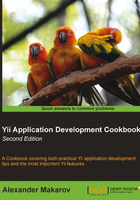
上QQ阅读APP看书,第一时间看更新
Defining multiple layouts
Most applications use a single layout for all their views. However, there are situations when multiple layouts are needed. For example, an application can use different layouts on different pages: two additional columns for blogs, one additional column for articles, and no additional columns for portfolios.
Getting ready
Set up a new application using yiic webapp.
How to do it...
- Create two layouts in
protected/views/layouts:blogandarticles. Blog will contain the following code:<?php $this->beginContent('//layouts/main')?> <div> <?php echo $content?> </div> <div class="sidebar tags"> <ul> <li><a href="#php">PHP</a></li> <li><a href="#yii">Yii</a></li> </ul> </div> <div class="sidebar links"> <ul> <li><a href="http://yiiframework.com/">Yiiframework</a></li> <li><a href="http://php.net/">PHP</a></li> </ul> </div> <?php $this->endContent()?> - Articles will contain the following code:
<?php $this->beginContent('//layouts/main')?> <div> <?php echo $content?> </div> <div class="sidebar toc"> <ul> <li><a href="#intro">1. Introduction</a></li> <li><a href="#quick-start">2. Quick start</a></li> </ul> </div> <?php $this->endContent()?> - Create three controllers named
BlogController,ArticleController, andPortfolioControllerwithindexactions in all three:class BlogController extends Controller { function actionIndex() { $this->layout = 'blog'; $this->render('//site/index'); } } class ArticleController extends Controller { function actionIndex() { $this->layout = 'articles'; $this->render('//site/index'); } } class PortfolioController extends Controller { function actionIndex() { $this->render('//site/index'); } } - Now try
http://example.com/blog,http://example.com/article, andhttp://example.com/portfolio.
How it works...
We defined two additional layouts for the blog and articles. As we don't want to copy and paste common parts from the main layout, we apply additional layout decorators using $this->beginContent and $this->endContent, as shown in the following diagram:

So, we use a view rendered inside articles layout as the main layout's $content.
See also
- The Using the controller context in a view recipe
- The Using decorators recipe